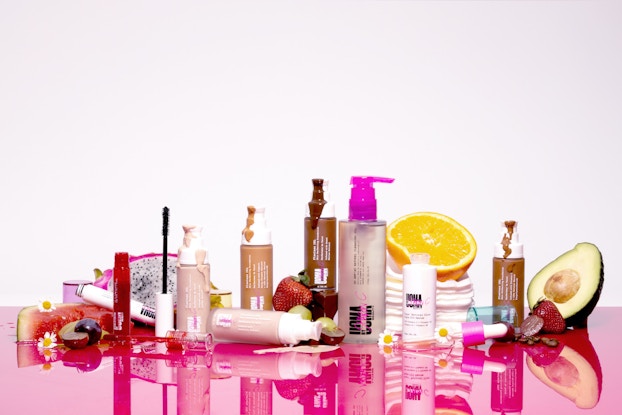
How one startup beauty brand landed placement at national retail:
- UOMA beauty founder Sharon Chuter spotted a void in the market for beauty products with a depth and breadth of options for women of color.
- Chuter subcontracted a manufacturing lab to produce her beauty line, tapping the supply-chain knowledge she honed working at companies such as L'Oréal and Benefit Cosmetics.
- Networking at a beauty industry event led to a chance meeting with Ulta executives, which resulted in a pitch meeting that landed the UOMA Beauty line at the retailer’s stores.
Sharon Chuter is on a mission to push diversity in beauty products to new heights, said the founder of UOMA Beauty.
Chuter’s commitment, 20-hour workdays and a no-time-for-performative-diversity ethos landed the startup, which boldly bills itself as “the most inclusive Black-owned beauty brand,” on big retail’s shelves.
UOMA’s 51-shade foundation line bowed at Ulta in 2019, breaking the 40-shade record set by Rihanna’s Fenty Beauty in 2017, a watershed collection that ignited an industry-wide push for inclusive beauty products. Walmart, the nation’s biggest retailer, then rolled out the exclusive UOMA by Sharon C collection to 3,000-plus stores last year. The brand also sells in Nordstrom and in the U.K.
UOMA Beauty is ‘a self-love movement’ — a vision that ‘should have been the death of my brand’
Despite a palpable industry shift toward diversity, beauty products today still largely target Caucasian women, Chuter said.
And some industry efforts toward inclusivity smack more “performative” than meaningful — “purpose-led for profit,” Chuter said.
Chuter knows the business world of which she speaks.
She got her start in it at age 19 as a beauty distributor for Revlon in Nigeria, her home country, later rising the executive ranks in Australia at brands like L'Oréal and Benefit Cosmetics.
In conceiving UOMA, which means beauty in Igbo, Chuter’s native tongue, she envisioned an international brand where all are welcome and “part of the tribe” that delivers “accessible and inclusive beauty for all,” she said. “We are a self-love movement [that aims to] leave the world a little bit better,” Chuter told CO—.
If that vision for UOMA Beauty sounds more Kumbaya than concrete business plan, Chuter would agree. “It was not a strategy,” she said. “It should have been the death of my brand.”
She instead discovered that a brand powered by passion ups its chance of success, citing Apple’s iconic founder as an example. “Steve Jobs, regardless of the money, had a mission,” she said.

Tapping hard-won industry know-how to break into retail’s big leagues
But passion alone did not open retail doors for Chuter. Leveraging hard-won industry know-how and a kind of going-the-extra-mile doggedness — “I made 50,000 lipstick units of the first products I ever developed for my brand because I’m crazy like that,” she said — was pivotal to breaking into retail’s big leagues with her own line.
And while Chuter’s insider access to the business of beauty — “I played with other people’s money for a decade,” she said — proved critical to UOMA’s launch, creating a brand from scratch called for seeing how the sausage is made, so to speak, so she could make it herself, from supply chain to product development.
“I’d never developed a brand before. It’s very scientific,” she said. It’s about understanding, “How do the best of the best make this work?” she said. “I dream big, but I was not blinded by my dream.”
Chuter tapped into the network of established laboratories around the world to manufacturer her beauty products, which is why for an entrepreneur, “the barrier to entry in beauty is very low,” she said, “as most companies work with third-party manufacturers.”
Product development started with identifying a genuine market need.
“As a founder, you see a gap in the market, which means you see something that doesn’t exist,” she said. “You must go and figure it out yourself, because you’re mad enough to think you can do it better, so you do it better. And that’s me,” she said. “So, I walked into a lab and did it better.”
I’d never developed a brand before. It’s very scientific. It’s about understanding, “How do the best of the best make this work?” I dream big, but I was not blinded by my dream.Sharon Chuter, founder, CEO and creative director, UOMA Beauty
Mastering supply chain fundamentals: ‘I’ve always had my finger in every pie’
Cracking big retail also meant mastering fundamental-yet-critical inventory management knowledge to answer questions, like, “Do I have the supply chain to supply [retailers] in the way they want to be supplied, with labeling, SKU-level compliance?” Chuter said.
That’s where Chuter’s account management experience at multinational companies with complex supply chains proved invaluable, as did injecting herself into every facet of the business. “I’ve always had my finger in every pie, and that’s why I’m able to do as much as I can do now,” she said. If somebody in supply chain couldn’t get it done, and I needed it, I would jump in and do it myself,” she said.
While Chuter was working in pharmaceuticals, for example, “everything we did had to go past regulatory” for approval, and often the answer was “no,” she said.
“I would read the handbook and come to them informed, referencing the relevant codes and regulations. This made it easy for the person to give me what I needed, and I also gained valuable knowledge, some of which came in handy for my brand,” Chuter said.
Case in point, UOMA Beauty items today exclude SPF, a designation that must clear steep regulatory hurdles that can impede marketing the brand globally. “This is a good example of where I have gone beyond the scope of my job, and how it’s paid off in my life now as an entrepreneur,” she said.
“I’m used to working 20 hours a day as a founder because I was working 20 hours a day when I was being paid $49,000 a year of salary. I was still doing that work because I wanted to.”

Breaking into ULTA: A serendipitous meeting with the C-suite
For Chuter, six months after ditching her corporate job to work on UOMA Beauty full-time, preparation met opportunity.
“I was new to America, at an event and no one was talking to me — so I went to a chair where people could be bothered talking to me,” she recalled.
“I was doing what I normally do, which is speaking up, talking about the changes that were needed in beauty. I didn’t realize I was sitting with the then-chief merchandising officer of ULTA, who is now the CEO [David Kimbel], and the two executive vice presidents of buying for the brand.”
ULTA then formally invited Chuter to pitch UOMA Beauty. Two weeks later, “I had a contract in my inbox.” she said. “So, I kind of started at the top but it was completely by accident. I had no idea who they were.”
As for Chuter’s partnership with Walmart, this time around, the retailer came calling. Walmart’s beauty buyer reached out to Chuter on Instagram to discuss a collaboration, which led to UOMA by Sharon C., an exclusive beauty line for the retailer priced from $5.99 to $23.99.
Success notwithstanding, Chuter’s big advice for entrepreneurs is to do things differently than she did. “Don’t follow my footsteps because my path was so hard,” she said. “I had to raise $3.5 million dollars; I never tested the concept. You’re learning on the job, under pressure to find 20 people [as staff] overnight, working seven days a week, 20 hours a day,” she said. “A slow build is so much better. There’s no shame in building your brand in 10 years versus two years.”
CO— aims to bring you inspiration from leading respected experts. However, before making any business decision, you should consult a professional who can advise you based on your individual situation.
Follow us on Instagram for more expert tips & business owners’ stories.
CO—is committed to helping you start, run and grow your small business. Learn more about the benefits of small business membership in the U.S. Chamber of Commerce, here.

What can membership do for your business?
Gain tools to stay informed, competitive, and connected by becoming a U.S. Chamber of Commerce member. Membership gives you direct access to expert policy insights, economic updates, and exclusive resources designed to help your business thrive. From behind-the-scenes analysis from D.C. to exclusive discounts and expert support, U.S. Chamber membership helps you navigate change and seize new opportunities.







